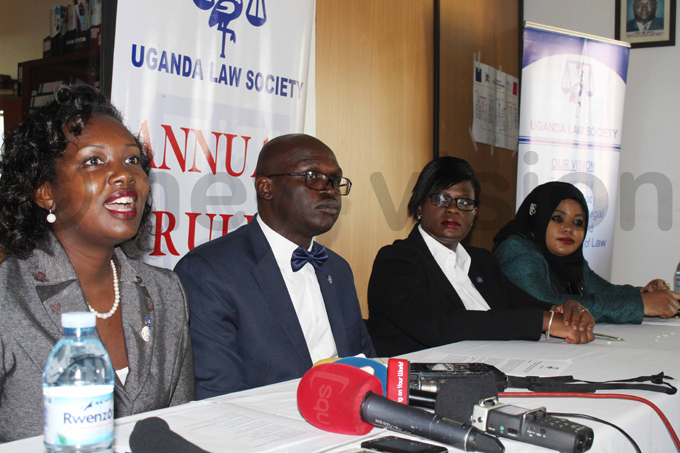Political cases overwhelming courts - ULS
Politicians were told to use other political tools to resolve their issues
The Uganda Law Society (ULS) has expressed concern over the mounting pressure on courts of law to settle political disputes, leading to arrests of some of its members orchestrated by some politicians that are dissatisfied with legal solutions.
Addressing the media at the ULS office in Kampala on Tuesday, the society's president Francis Gimara said some of the cases are largely politically motivated and shouldn't have been brought to the courts of law.
Gimara thus called on the Judiciary to exercise independence and dispense justice without fear and favor so that justice is not only done but seen to be done.
"Government should not bend the law to settle political disputes. It is time for government to tone down on its aggressiveness and adopt a more inclusive, tolerant and conciliatory approach," he said.
He appealed to political actors who have been in the recent past engaged in political contestation to use other political tools to resolve their issues.
"Supreme Court already ruled on the election petition, but grievances still exist. Courts can resolve disputes, including political disputes, but when you look at facts and the situations we are in now; courts may not resolve the political contestation," he said.
Towards the general elections early this year, courts put on hold all other pending cases to allow judges expeditiously handle and determine election petitions within six months.
In an interview, Paul Gadenya, the chief registrar said that although the judiciary is currently dealing with about 120 petitions from the parliamentary elections, the courts have demonstrated that they can hear those cases in a period of three months.
"Yes there are disruptions now and other cases are not being heard, but we are able to handle the pressure. There is no crisis. We would only appreciate if we had more judges and magistrates," he said.
Case backlog
Regarding the issue of case backlog in courts, Gimara said the Judiciary is the most underfunded arm of government, leading to delayed justice.
ULS thus called on government and the new parliament to quickly enact the administration of the judiciary bill to allow for the financial autonomy of the judiciary, such that the judiciary is able to control its own funding and be held accountable, just like any other arm of government.
 (L-R) ULS secretary Pheona Wall, Gimara, ULS vice president Alice Namuli Blazeri and ULS member Shifra Lukwago during the briefing. Photo by Racheal Nassuuna.
(L-R) ULS secretary Pheona Wall, Gimara, ULS vice president Alice Namuli Blazeri and ULS member Shifra Lukwago during the briefing. Photo by Racheal Nassuuna.
"For instance in a land dispute, a good judgment would entail a magistrate to visit the disputed land, but many times the magistrates will say they do not have transport, so they end up writing judgments without visiting the disputed land," he said.
He said that limited funding to the judiciary is one of the major issues that contribute to case backlog.
Speaking at the 43rd graduation ceremony at the Law Development centre last Month, Chief Justice Bart Katureebe said a new report on the judiciary showed that there are about 1000 cases that are more than ten years old.
According to Justice Ministry spokesperson Solomon Muyita, a case becomes backlog when it is more than two years old.
This financial year, a total of sh93b was allocated to the Judiciary, which according to Gadenya was insufficient, given that they had asked for a budget of Sh293b.
For the next financial year, the funding has been increased to Sh115b. "We welcome the additional funding. Most of the money will go to clearing the backlog, but it is not enough, because criminal cases are expensive," he said.
He added that enactment of the bill would allow the ministry to plan appropriately and employ enough magistrates and judges to deal with the cases.